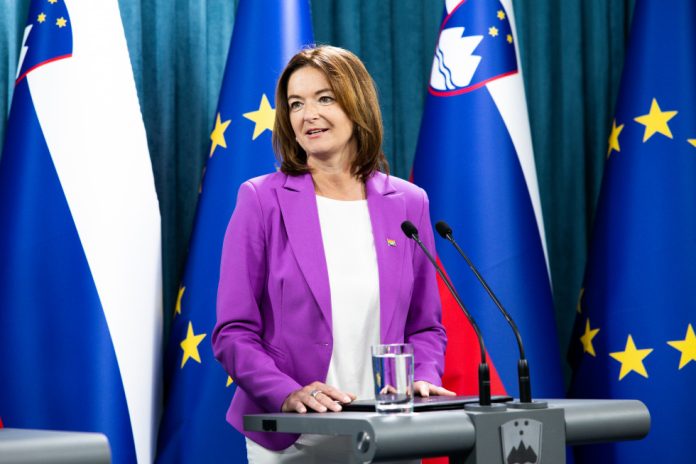At a joint press conference with President of the Republic of Slovenia Nataša Pirc Musar and Prime Minister Robert Golob following the election of Slovenia as a non-permanent member of the UN Security Council, Deputy Prime Minister and Minister of Foreign and European Affairs Tanja Fajon outlined the substantive priorities of the membership.
In the secret ballot of the UN General Assembly on Tuesday, 6 June, Slovenia received a strong majority of 153 votes in the first round to become the representative of the Eastern European electoral group on the UN Security Council as a non-permanent member for the 2024–2025 term.
“The confidence UN member states have placed in Slovenia is also a great responsibility and incentive to make progress during the membership term on issues that have been heard and discussed with representatives of other countries,” said Minister Fajon, who met with representatives of around 150 states during Slovenia’s candidacy campaign last year.
“The two themes that emerged most strongly from the discussions were the need for dialogue and trust-building. The feeling that some countries decide the fate of others, without consulting the countries concerned and their neighbours and without understanding the local context, is all too common,” said the minister. She expressed her confidence that Slovenia, as a country that stands for dialogue, peace, security and stability in a deeply divided world, will be able to find appropriate solutions.
During the two years of its membership in the UN Security Council, Slovenia will pay special attention to the common issues “that unite rather than divide UN member states”, i.e. environmental issues (climate change, water diplomacy) and their impact on security, food and energy security, protection of civilians and the most vulnerable groups of population in conflicts, ensuring gender equality in the security, political and economic spheres, and women’s empowerment. Slovenia will also work to put the effectiveness of peacekeeping operations on the UN’s agenda, which is a priority concern for African countries in particular. The security situation in the Western Balkans will be another unavoidable issue. The debate on Security Council reform will also be crucial to ensuring that this most important of UN bodies remains effective.
Minister Fajon outlined the next steps towards becoming a non-permanent member of the Security Council: “Over the coming weeks and months, a series of consultations will take place at working and political level with both permanent and elected members of the UN Security Council, with those members who are leaving the Security Council at the end of the year, and with many others who wish to engage with Slovenia,” she said.
The Ministry of Foreign and European Affairs intends to set up a special coordination group for membership preparation and UN Security Council membership. Additional staff will be assigned to the departments and services dealing with issues on the Security Council’s agenda, and the Permanent Mission in New York will be further strengthened to deal with the day-to-day tasks associated with UN Security Council membership.

